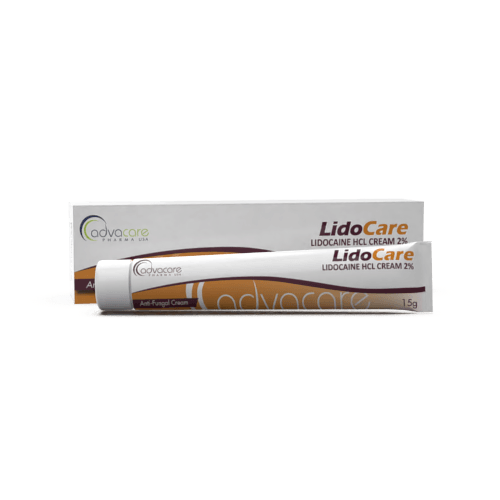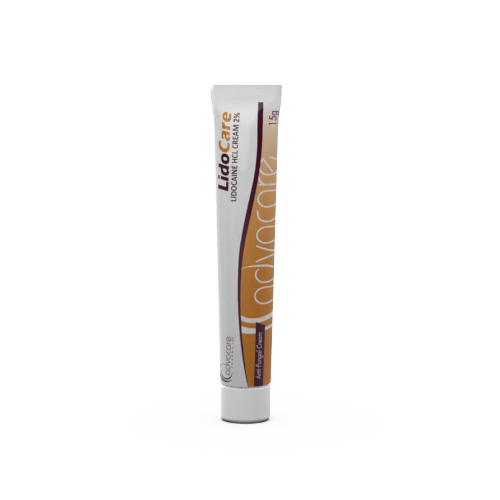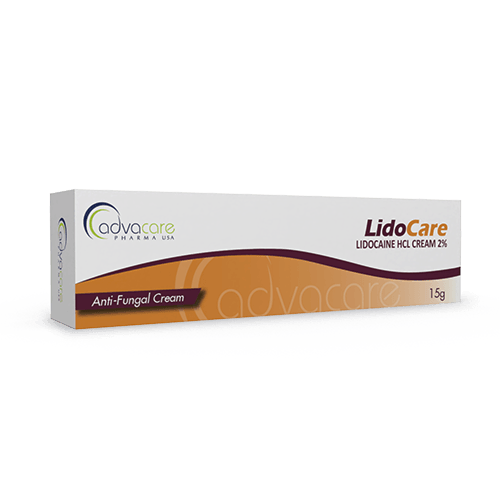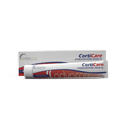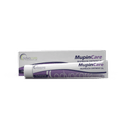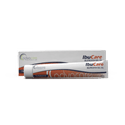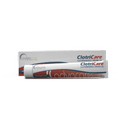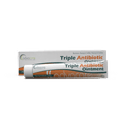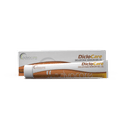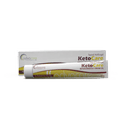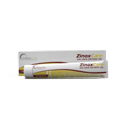- Home›
- Pharmaceuticals›
- Topicals›
- Medical Ointments›
- Lidocaine Cream
Lidocaine Cream
Form
Dosage
Packaging
What is Lidocaine?
Active Ingredients: Lidocaine HCl
Lidocaine HCl Cream is a local anesthetic used to treat skin irritation caused by conditions like sunburns, poisonous plant contact, insect bites or stings, or minor burns. This medication is also used to decrease discomfort or pain during certain medical procedures or exams, such as sigmoidoscopy or cystoscopy.
Lidocaine, also called by the name lignocaine, is classified as a local anesthetic. It works by blocking the nerve signals in the body.
This product provides dermal analgesia by releasing lidocaine into the epidermal and dermal layers of the skin. This is an amide-type local anesthetic agent that stabilizes neuronal membranes by inhibiting the ionic fluxes required for the initiation and conduction of impulses, which leads to local anesthetic action. The onset, depth, and duration of dermal analgesia depend on the duration of the treatment. This medication can provide good analgesia when applied for around 30-60 minutes.
Lidocaine HCl cream is absorbed systemically but it depends on the duration of application and to the area where it is applied. It is unknown if this drug is metabolized into the skin. The absorption of topical lidocaine is very low and there is only increased absorption in areas like mucosa or previously damaged skin.
This medication is also available in the form of an injection.
AdvaCare Pharma is a trusted global supplier of Lidocaine HCl Cream. We offer a wide range of high-quality and cost-effective medications that are available for distribution. Our factories are GMP-certified and are regularly inspected to ensure meet the high standards necessary to comply with WHO guidelines and standards.
Why are we a top Lidocaine Cream manufacturer?
AdvaCare Pharma is a US pharmaceutical company that manufactures Lidocaine Cream, and our entire range of 50+ topical treatments in cream, ointment and gel dosage forms, under stringent GMP regulations. Our distinctive approach to business fosters a highly collaborative relationship with our pharmaceutical distributors. For the past 20 years we have established a reputation as a trusted Lidocaine manufacturer, one of the 500+ pharmaceutical products in our comprehensive range, across more than 65 global markets.
Uses
What is Lidocaine used for?
It is used to cause localized numbness in patients before medical procedures. It is also used to treat minor skin irritations such as sunburns, poisonous plant contact, insect bites or stings, or minor burns.
How is Lidocaine Cream used?
This medication is manufactured as a non-greasy sterile cream, which is intended for topical administration directly to the skin. Always wash hands with soap and water before using this medication, unless the treatment is to the hands.
What dose should be applied?
The usual dose is 2g, applied 3-4 times per day. The maximum dosage is 5g in one application.
There is no data available about the dosing in adults, geriatric, and pediatric patients. There is also no data available about dosing in patients with liver or renal impairments. Consult with a doctor to get personalized advice based on your current health condition.
Refer to a doctor or healthcare professional for the exact dosage and duration of treatment.
Who can use Lidocaine HCl?
This cream is used as an anesthetic for pain relief of pruritus, pruritic eczema, abrasions, minor burns, insect bites, pain, soreness, and discomfort due to pruritus ani, pruritus vulvae, hemorrhoids, anal fissures, and similar conditions of the skin and mucous membranes. Special consideration should be taken when treating several groups of patients with this medication.
Pregnant In general, this product is safe for pregnant women and does not lead to any adverse effects. Pregnant women or those who plan to get pregnant should inform their doctors about any products they are using at the moment including Lidocaine HCl. There is not enough data available about the safety and efficacy of this product in pregnant women.
Nursing This cream is also considered safe for breastfeeding women, but there is not enough evidence if this drug enters human milk because it is a product that is applied topically. Nursing women should consult with their doctor if they are using or planning to use this product.
Pediatric There is not enough data available about the safety and efficacy of this ointment in pediatric patients. It is generally safe for all patients, but a consultation prior to application with a doctor should be made. If children develop some side effects after the treatment, the usage should be limited.
Geriatric There is no data available about the usage of this product in geriatric patients. If you belong to the age group over 65 years of age you should consult with a doctor before using this product.
Other warnings
This product does not have a strict dosing schedule, but patients should advise their doctor prior to using it.
Side Effects
As with all pharmaceuticals, some unwanted effects can occur from the use of Lidocaine HCl Cream.
Common side effects include, but may not be limited to: • irritation or redness near the site of application • dizziness • nausea
For a comprehensive understanding of all potential side effects, consult a medical professional.
If any symptoms persist or worsen, or you notice any other symptoms, please call your doctor.
Precautions
Do NOT use Lidocaine HCl Cream if:
- You are allergic to lidocaine or any other ingredient.
- You are allergic to other local anesthetics.
- You are receiving treatment concurrently with class I antiarrhythmic agents (quinine, flecainide, disopyramide, or procainamide).
- You have Stokes-Adams syndrome, Wolff-Parkinson-White syndrome, or cardiac block without a pacemaker.
- You have prior use of amiodarone hydrochloride.
This drug should be used with caution in ill, elderly, or debilitated patients.
Before using this medication, patients should inform their doctors if they are allergic to some anesthetics or if they have any other allergies.
Patients should inform their doctors about their medical history, especially in cases of broken skin, heart and liver diseases, and blood disorders like methemoglobinemia. People should inform their healthcare providers if they undergo any MRI tests before taking this ointment.
Children might be more sensitive to the side effects of this drug.
Pregnant women should inform their doctors if they are planning to use Lidocaine Cream. Breastfeeding women should also inform their doctors if they are using this cream.
Patients should inform their doctors about any prescribed or unprescribed drugs they are taking at the moment.
Do not get this medicine in the eyes, as it can cause an eye infection.
This product should be kept out of reach of children and pets.
Lidocaine 5%: Why the most common dose?
Lidocaine 5% is used for its strong efficacy in providing local anesthesia and pain relief for intense procedures. Lidocaine 2% is preferred for minor procedures with a lower risk of side effects. Lidocaine 4% dosage provides a middle ground, delivering substantial pain relief.
References
5% Lidocaine Hydrochloride Cream for Wound Pain Relief: A Multicentre Observational Study
Lidocaine hydrochloride is often used for treating painful wounds. This is a prospective, multicentre study that examined the effects of 5% lidocaine cream on wound pain relief.
This research included 78 patients with painful wounds treated with 5% lidocaine cream for two weeks. The perception of pain in the patient was recorded by using the 5-point Visual Rate Scale (5VRS) and the 11-point Numerical Pain Rating Scale. All medications and adverse events were evaluated in a daily diary. The main goal was to evaluate the wound pain relief based on the results of 5-VRS and pain intensity based on the 11-NPRS testing from baseline to the end of treatment.
Seventy-eight patients, with a median age of 67.5 years (ranging from 18 to 96 years), participated in the study, with women comprising 62.8% of the cohort. The wounds treated included traumatic wounds (n=39), venous ulcers (n=25), post-surgical wounds (n=6), pyoderma gangrenosum (n=6), vasculitis (n=1), and pressure ulcers (n=1). Throughout the treatment period, there was a reduction in pain intensity from the initial baseline level (mean score 6.7) to the end of treatment (mean score 3.0; p < 0.0001). Nine patients discontinued treatment prematurely, citing reasons such as healing (n=4), wound improvement (n=2), and adverse events related to treatment (n=3). Thirteen patients experienced a total of 25 adverse events, with four of them being related to the treatment.
The findings from this study indicate that treatment of painful wounds with 5% lidocaine cream for 14 days results in reduced pain intensity, and shows high safety and tolerability.
Efficacy and Safety of a Lidocaine Gel in Patients from 6 Months up to 8 Years with Acute Painful Sites in the Oral Cavity: A Randomized, Placebo-Controlled, Double-Blind, Comparative Study
This is a randomized, double-blind, placebo-controlled study that was designed to generate efficacy and safety data for a lidocaine gel (2%) in younger children with painful conditions in the oral cavity.
It included 161 children that were separated into two subgroups: 4–8 years, average age 6.4 years, treated with verum (treatment drug) or placebo, and 6 months – < 4 years, average age 1.8 years, treated only with verum.
Pain reduction was evaluated from pre-administration to 10 or 30 minutes post-administration, along with the evaluation of adverse effects and local tolerability. In Group I, pain reduction was observed immediately after verum treatment compared to placebo. In Group II, there was a statistical decrease in pain ratings after the treatment. Among 161 patients, only seven reported adverse events, but no side effects were related to the lidocaine cream. Local tolerability was rated as very good in over 97% of cases included in this study.
The conclusion of this study is that for painful oral sites, 2% lidocaine gel proves to be a valuable short-term treatment option for painful sites in the pediatric population.

You might be interested in...
Why AdvaCare Pharma?
As an industry leader, we are aware of our responsibility to provide affordable and sustainable solutions to improve healthcare worldwide.
